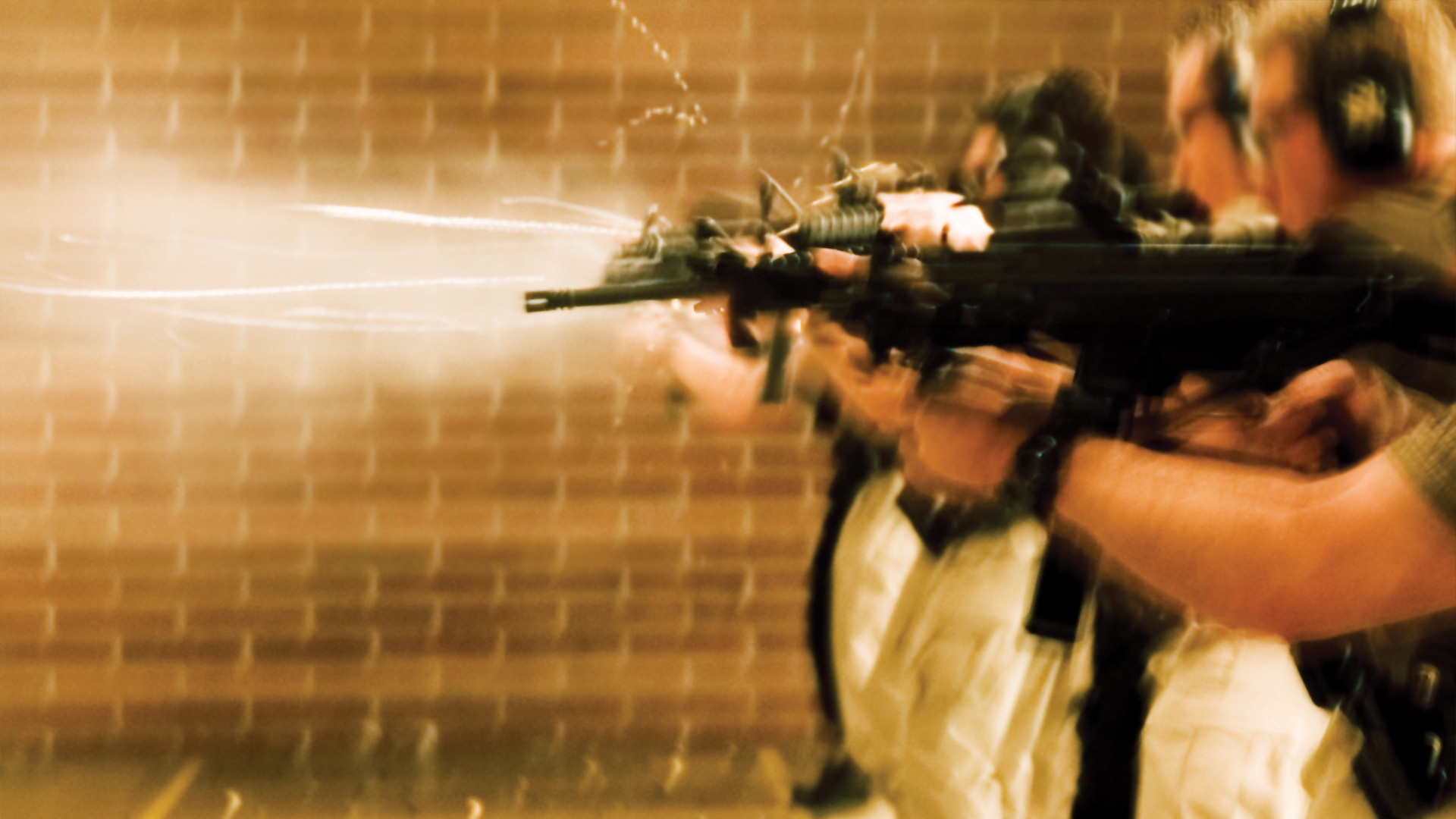
Most police officers are familiar with classic simulation scenarios such as a man standing at a door who quickly raises his hands to reveal either a knife, flip phone, wallet, gun or empty palms. In typical training settings, participants are considered successful if they shoot when justified or abstain when not. If it gets too easy, some instructors may add laps around the building or pushups to elevate the student’s heart rate.
This training method is inadequate, and actually it has never been sufficient. Here are three simulator training practices to stop doing immediately and some suggestions on what to do instead.
Problem #1: Failing to have a learning objective
De-escalation, active shooter, homeless encampment and mental health are all general practice areas to train for in simulation, but no matter how realistic or challenging the scenario, none of them provide a learnable action item by themselves. If your agency is required to complete periodic de-escalation training, choosing a random scenario from your favorites folder and selecting the branch to comply when the student says, “Calm down, buddy, drop the knife” is generally useless to the learner. It’s also largely ineffective as a de-escalation tactic, but that’s a topic for another day.
When you give everyone the same scenario, you’re treating everyone as if they had the same skill level and ability. Randomly selecting scenarios also fails to take into account each trainee’s individual cognitive capacity for that moment in time or a metric for assessing their improvement as their learning path continues. Training not designed for the learner, or failing to provide measurable results, is training time wasted.
Do this instead: Have a plan before the student enters the training room. Incorporating a classification system to distinguish student capabilities and expectations — such as Bloom’s Taxonomy — is especially helpful in developing structured outlines for novice participants for each topic and a framework or grading rubric for assessing student skill level. Learning objectives for participants should include an action verb that’s observable, with words like recognize, demonstrate, differentiate and implement. For advanced or more experienced trainees, consider incorporating design elements of cognitive load theory to push a student’s capacity for developing long-term knowledge into automated response.
Learning objectives should not be the same for a novice and an expert, so it’s important to make sure your criteria for success is appropriate for the learner in front of you. If the scenario includes responding to an incident at a homeless encampment, a novice may be expected to recall the local resources for food and medical care when asked for help, whereas an experienced officer may be expected to simultaneously know those and recognize signs of neglect or abuse. Additionally, an expert officer may be able to accomplish all this while managing a crowd or communicating a plan to others for removing bystanders who are compounding an already difficult situation. Plan ahead and choose scenarios that meet targeted learning objectives.
Problem #2: Focusing on rapid shoot/no-shoot scenarios
Testing an officer’s ability to react quickly, decisively and appropriately with force is an important part of law enforcement training, but there is much more we can do to prepare officers for the types of calls they will regularly encounter. One valid concern with habitually choosing shoot/no-shoot scenarios is instructors are priming the trainee to anticipate that calls will end rapidly — one way or another. Trainees can quickly develop the habit of anticipating the high likelihood of either a force option requirement or a “gotcha” moment every time they enter the simulator room. As with any behavior, the more this is practiced in training, the more habits are being formed that could translate into the field. As a result, if they encounter a similar scenario in the field, regardless of whether the same force option is justified or not, they are cognitively preloaded with a practiced response from training.
Do this instead: One benefit of the evolution of modern simulators is the ability to choose from a large number of scenarios (over 1,000 in some) and many contain nearly limitless branching options and looping functions. The advantage of continuous looping in scenarios is to keep officers engaged for the actual time it takes to work through realistic encounters. Consider the amount of time it can take to isolate and interview someone in the middle of a crowded chaotic setting or manage someone in the middle of a mental health or drug-induced crisis.
If the training time is available, create habits that help officers train for the endurance required for a lengthy situation. Consider adding audio clips in the middle of a scenario. Hearing things that are unexpected can increase situational awareness and memory recall. In addition to shoot/no-shoot scenarios, a well-designed training program should incorporate less-lethal options, officer down drills, buddy and self-rescue, team communication and movement, de-escalation scenarios, triage, realistic radio traffic to dispatch and responding officers … the list goes on and on. Be creative when you’re developing learning objectives and selecting scenarios, and encourage the creativity of your students when they’re participating.
Problem #3: Letting the scenario run and finishing with a review of shot placement
Starting a scenario, observing, doing a quick debriefing to say “nice headshot, good job” and moving quickly on to the next scenario is not only an inadequate representation of the job, but it fails to provide opportunities for insight generation or creative thinking that leads to officer cognitive development. Instructors who run simulator training by pressing play and providing low quality debriefing sessions without ample time and prompts for thoughtful discussion aren’t instructors. Observing for testing or grading purposes requires a proctor or evaluator, not an instructor. There is a time and place for skills verification, but it’s important to separate testing from training.
Do this instead: Insights are those “a-ha” moments that generate innovative ideas about how to do things creatively.1 Creative thinking is one of the most critical skills required for policing, and training to develop it can help novice officers become independent and empowered thinkers capable of advanced problem solving without waiting to be told what to do. Pausing scenarios in the middle to prompt a shift in response, then debriefing officers with questions instead of telling them what they did right or wrong is an opportunity to cultivate new thought processes. Consider framing questions around how to approach situations within applicable case law, state legal standards and departmental policies while providing a setting conducive to generating insights.
This is also the time for officers to work on recalling specific features of the scenario, such as describing the scene, details of the force response and post-incident responses. If relevant to the scenario, pre-assault indicators, officer vs. threat factors and other influential circumstances should all be covered during these debriefings. If you don’t have time for debrief, you don’t have time for training.
This is another opportunity to increase your expectations of expert officers. With newer officers, instructors should consider pausing the scenario to ask the student about the scene or details of the force response. This is the time to ask questions and discuss how state law and department policy affects response options. On the other hand, expert officers may be expected to recall the same or more detail without prompting from the instructor. This is another reminder of the importance of knowing the individual student’s place on the novice–expert scale.
Simulators alone do not provide training
Technology is a tool for the professional instructor. Incorporating instruction before, during and after scenarios is the secret sauce of simulator training that creates training value. You may think you can’t afford to take an officer out of service for a lengthy training session, but the truth is, you can’t afford to do any less. As the instructor, putting in the effort and preparing for your students doesn’t just get better performance results, it shows respect and demonstrates to your officers that they’re worthy of your time.
As seen in the October 2021 issue of American Police Beat magazine.
Don’t miss out on another issue today! Click below:





